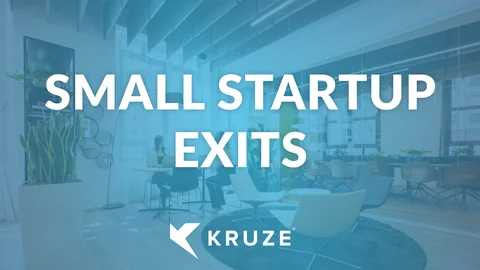
At Kruze, we advise hundreds of startups on their finance and accounting - and we are seeing a major rise of smaller, but meaningful, startup acquisitions. This is definitely becoming a trend in 2022.
We are seeing a lot of seed stage or companies that raised a seed plus extension round getting acquisition offers. We’re recording this in August of 2022 and the NASDAQ’s been down quite a bit. And what we’re seeing is bigger companies are doing some bargain hunting. They’re going around and they’re looking for companies mostly that fill a technology gap and that have some traction. In general, these are synergistic with what the acquiring company does in their normal course of business
The small startup exit trend
In one week alone in August of 2022 we saw three of these alone which are $25 to $45 million acquisitions - for startups that only raised $3 to $8 million in capital. So they haven’t done the really big Series A, the $10, $15, $20 million Series A, which means the investors are sitting on lower, more reasonable valuations.
The reason why these startups can entertain these acquisitions is that they haven’t raised that much money. These are good deals, not great deals, these are good deals for the VC Syndicate or the angels that invest in them. They’re going to get a really nice return on capital.
Walking through the math for the investor, you can understand why they are not against these smaller exits. For example, consider a company that’s sold $5M in equity via an early-stage round and that is valued at $20M post. A $40M exit will give the investor 2x their money, likely in a short period of time. Some preferred stock may also pay back some of their principal, which can slightly boost the return to the investors.
Now, this return isn’t the type of a return that a VC really shoots for (read our piece on VC return expectations). However, quickly returning capital early in a fund’s life can let a fund do what is called “recycling” (we’ll cover this topic at a later date) - in essence instead of returning the capital to the investors, the VCs get to take that 2x return and invest it as if it was fresh capital in the fund. This boosts the capital available to invest, and if that capital goes into a big winner, this can really help the overall fund returns.
Small exits can be life changing for the founders
But what’s really interesting is these are life-changing deals for the founders. If you’ve only raised 3 to 5 million dollars, you’ve probably only sold about 20 or 30% of your company. Therefore the management team owns 70% to 80%. 70% of 40 million dollars is $28 million. That’s $28 million split amongst the management team. And most of these companies are run by younger founders who don’t have huge personal lives and personal expenditures.
Although after these deals are done, they probably will upgrade their lifestyle a little bit. So this is very, very meaningful for them. Besides the life-changing money, it’s also a win on the scoreboard. That’s something that oftentimes people underestimate. When you get a nice win, you make some money for your investors, you set yourself up for life. The next startup is a lot easier to fund.
Small exits - big fun
So, we as a firm are very excited about the small M&A trend for lightly funded companies. It’s very rewarding to see founders cashing out and doing these acquisitions. And it’s really good for the acquirers, too. And we believe that we are one of the best, if not the best, CPA for startups in helping founders be ready for these exits and due diligence.
And for the acquiring companies, this is bread and butter work. Extending product capabilities, adding another vertical you can sell into, doing something very synergistic in a downturn. Very smart acquisition ideas by the business development, corporate development teams at these bigger companies, and their M&A teams are set up to efficiently process and run due diligence on these acquisitions.















